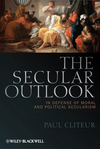
The Secular Outlook: In Defense of Moral and Political Secularism
| List Price: | US $116.50 |
| Government Price: | US $67.16 |
The Secular Outlook: In Defense of Moral and Political Secularism
Many social thinkers have predicted a steady move towards the practice of secularization in our political, moral, and social realm. Instead, a resurgence of religious fanaticism and extremism now poses an immediate threat to liberal democracies in all its forms. In his new book, The Secular Outlook: In Defense of Moral and Political Secularism (September 2010), Paul Cliteur argues that there are solutions to this dilemma. He analyzes how we, as a society, should react to the spiritual and ideological challenges that radical religious movements pose to Western liberal democracies, asking “what is the most promising reaction to these challenges”?
To many living in the contemporary world it is the correct time and place to put the solutions Cliteur proposes into action. Inspired to write the book through his experience with the Danish Jyllands-Posten cartoon incident, Cliteur urges people to brainstorm on how to overcome political conflicts and difference, recognize and seize the true working values of a successful democracy, and begin to adopt a more constructive and less divisive “secular outlook” on society and politics. He argues that a religiously neutral state can be achieved through critical thinking, free speech, and ultimately the adoption of moral secularism (separation of religion and morals) and political secularism (separation of church and state), therefore working in the interest of all citizens, not just theists or atheists.
Unlike the more polemical arguments of authors such as Dawkins, Harris, and Hitchens, philosopher Paul Cliteur reveals how religious believers and non-believers can live together peacefully by pointing to secular, political, and policy principles that can inspire citizens of democracies to achieve social harmony and cohesion.
Cliteur also presents a new analysis of the nature of religious terrorism, and claims that terrorists are in the grip of a rather consistent and narrow religious worldview that needs to be addressed in institutional terms as well as penal terms. He also shows why politicians, policy makers and intellectuals are engaged in a dangerous and costly game to try to appease terrorists by making concessions.



